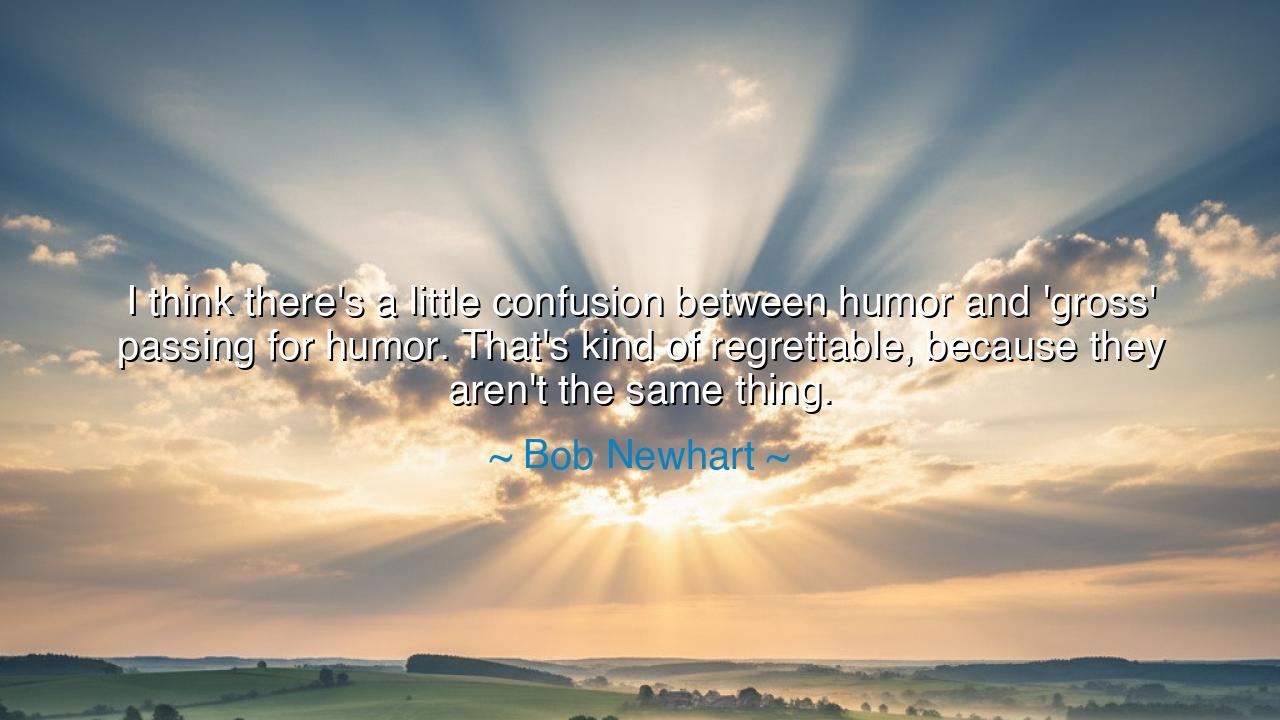
I think there's a little confusion between humor and 'gross'
I think there's a little confusion between humor and 'gross' passing for humor. That's kind of regrettable, because they aren't the same thing.






In the boundless depths of human experience, few things possess the power to elevate or to degrade as humor does. It is a tool of the soul, a divine spark that reveals the absurdities of life and offers us clarity, even in the darkest of times. Yet, in this vast realm of laughter, there has arisen a great confusion—a confusion that Bob Newhart, with his timeless wisdom, seeks to address: "I think there's a little confusion between humor and 'gross' passing for humor. That's kind of regrettable, because they aren't the same thing." These words, though simple, carry a profound truth—humor, in its truest form, is not a tool for vulgarity or excess. It is a means of enlightenment, not degradation.
In the ancient world, humor was often the domain of the wise. The great Socrates wielded it like a sword, not for amusement but as a means of cutting through the fog of ignorance. His method, known as the Socratic method, often involved irony and playful humor, leading his followers to confront the contradictions within their own thinking. This humor was not crude—it was sharp, insightful, and full of truth. Newhart's words remind us of this essential difference: true humor illuminates, while gross humor, though it may stir laughter, often leads only to confusion and a diminishing of the spirit.
Let us look to another example—the works of Aristophanes, the master of Greek comedy. His plays were filled with sharp wit and biting satire, but they were never vulgar. His humor served a higher purpose: to reveal the hypocrisies of Athenian society, to challenge its leaders, and to provoke thought among the people. Aristophanes did not descend into the base and the crude to make his audience laugh; instead, his humor elevated them, inviting them to laugh not at the folly of others, but at the folly of their own assumptions. Gross humor, in contrast, does not seek to reveal; it seeks only to entertain through excess, shock, and offense. And in doing so, it strips away the dignity of the spirit, leaving only a fleeting laugh devoid of meaning.
Newhart's call to separate true humor from grossness is not a call for the suppression of laughter, but for the elevation of it. Consider the wisdom of Marcus Aurelius, the Stoic emperor, who in his Meditations used humor to reflect on the human condition, always with an eye toward the absurdity of human pride and ambition. His humor was dry, not meant to offend, but to reveal the limitations of the human soul. He did not mock, but rather acknowledged the contradictions of life with a quiet, knowing smile. In the same way, Newhart's humor reflects this understanding: a humor that sees the world for what it is, full of flaws, but never degrading—it is humor that invites laughter and wisdom to walk hand in hand.
Let us not be deceived by the illusion that gross humor is the same as true laughter. In a world where shock value often reigns supreme, it is easy to mistake the crudeness of modern entertainment for insightful humor. But as Newhart warns, this confusion is regrettable, for it leads us astray. It diminishes the power of humor, making it an empty gesture that fails to nourish the soul. True humor, like the ancient sages, seeks to build—to elevate, to enlighten, and to reveal the deeper truths of our existence. It invites us to laugh at the absurd nature of life, but with a sense of understanding, not mockery.
So, what lesson do we carry forward from Newhart's wise words? The first is to be mindful of the humor we embrace. In our own lives, let us seek the humor that lifts us, that speaks to the human condition with grace, with insight, and with a recognition of our shared humanity. Let us turn away from the crass and the vulgar, from that which seeks to entertain by shocking or degrading, and instead, embrace the kind of humor that opens the heart and mind. Let our laughter be one of recognition, not one of degradation.
Let us live as the great philosophers lived—not as mockers of the world, but as gentle observers, using humor not to hurt, but to heal. In this, we fulfill the true potential of humor: to bring light into the darkness, to find joy in life's absurdities, and to do so with wisdom. We are called to embrace humor that does not drag us down, but that uplifts, that reveals, and that connects us to the profound truths of our existence. In this, we find not only laughter but understanding—and in understanding, we find peace.






AAdministratorAdministrator
Welcome, honored guests. Please leave a comment, we will respond soon